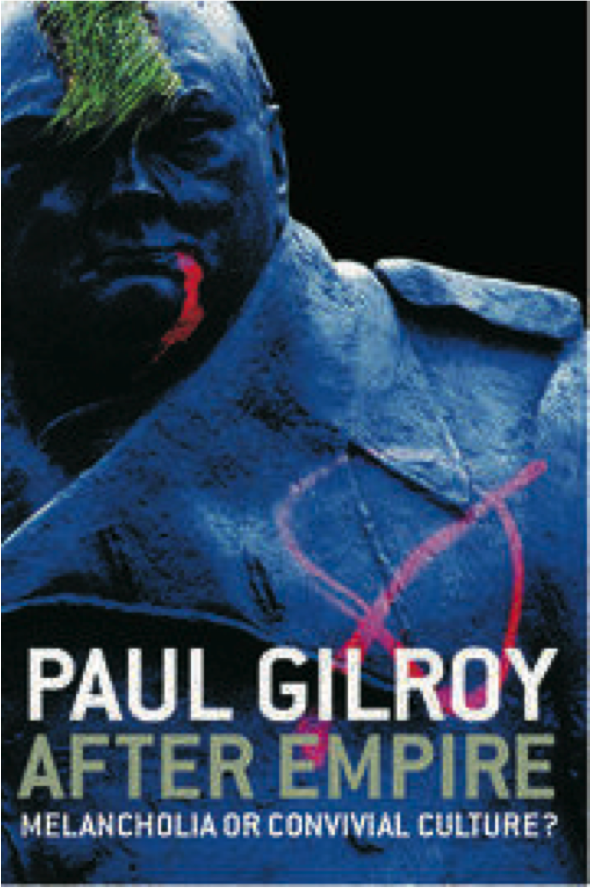Conviviality
Paul Gilroy (2004, 2006) made an important contribution by linking convivial culture to colonial pasts, amnesia, and denial, arguing that these create unique political and social fields in which we must navigate and organize (2006, 2).
After Empire: Melancholia or Convivial Culture? (2005) is Gilroy’s in many ways a sequel to his classic study of race and nation: There Ain’t No Black in the Union Jack: The Cultural Politics of Race and Nation (1987).

After Empire explores Britain’s failure to come to terms with the loss of its empire and pre-eminent global standing. Drawing on texts from the writings of Fanon and Orwell to Ali G. (satirical fictional character created and performed by English comedian Sacha Baron Cohen), etc. shows that what we make of the country’s postcolonial opportunity will influence the future of Europe. Also referencing the political language of the post 9/11 world as a new point of departure he defends long-suffering multiculturalism against accusations of failure.
Gilroy takes the discourse of human rights to task in terms of both racism and imperialism. Gilroy inspects how this imperial dissolution has resulted not only in hostility directed at Black people, migrants, and foreigners but also in the country’s inability to appreciate the ordinary, unruly multi-culturalism that has evolved organically and unnoticed in its urban centers.
Gilroy thus extended the notion of conviviality not only to a context of “living together in real time” (Gilroy 2006, 6), but to a culturally complex, mobile global world; as argued by Amanda Wise and Greg Noble (2016, 424): “It is with Gilroy that cultural differences arising from the long-term consequences of post-colonialism, mass migration, multicultural policies and transnationalism are foregrounded.”
Other references: Ivan Illich (born in Vienna in 1926, died in 2002), theologist, philosopher, etc. For Illich, conviviality is a term to describe what is essentially the opposite of industrialism. His 1971 book Deschooling Society criticizes modern society’s institutional approach to education, an approach that constrains learning to narrow situations in a fairly short period of the human lifespan. Tools for Conviviality is a 1973 book by Illich about the proper use of technology. The book was inspired by the movements of the 1960s Third-Worldist that incorporated elements from African decolonial movements as well as the diverse voices in support of the oppressed that were spreading at the time throughout Latin America (Costa 2019). The “tools for conviviality” were developed to negotiate industrialization by taking control of the tools and production processes that shaped people’s lives. Convivial tools are tools which are free, creative, and can be used by anyone with minimal special training.
Recent examples of theoretical works that critically examine the connection between conviviality and inequality in relation to race, gender and class relations, borders and migrations are the works of Lugones (2007), Gržinić (2018) and Pugliese (2015).
Another example of the revision of the concept of conviviality can be found in Achille Mbembe’s Critique of Black Reason. Mbembe (2017, 180) concludes his book with an epilog entitled “There is Only One World,” which implies both what he calls the Becoming Black of the world as the paradoxical universalization of the Black condition in neoliberal global capitalism. He also refers to Édouard Glissant’s idea called “Tout-Monde, All world.” Mbembe writes: “There is only one world […] composed of a totality of a thousand parts. Of everyone. Of all worlds” (2017, 180). We share Mbembe’s emphasis on sharing the world with others as a system of exchange, reciprocity and mutuality (181).
As such, the concept of conviviality stands in opposition to the normative narratives of multiculturalism, integration and assimilation, and it is this understanding of conviviality that we build on to update and extend it. Following Gilroy, it is crucial to understand the obstacle of amnesia to the potential of conviviality and convivial futures. Amnesia means a closure of experience, memory and history. The combination of ignorance, denial and guilt creates a unique context that must be constantly questioned.
Pandemic
The theoretical context of pandemics involves narratives of contagiousness that re-structure space, belonging and existing societal relationships. In our research, we will also look at the COVID-19 outbreak and present the post-COVID-19 period as models of power. Every power has its own history of contagiousness. This wider context of the pandemic opens up our research on conviviality in relationship with the neo-colonial world order that is being critically addressed by decolonial and subaltern theories and art practices. The theoretical frame we will engage in includes investigations of narratives of contagiousness, oppressive border regimes, biopower and necropower (Deleuze 1992; Gržinić 2018, 2016; Stanescu 2013; Esposito 2006; Foucault 2003; Mbembe 2003, 2019). More broadly the critical research work on the cyclical occurrence of crisis as states of emergency in capitalism will be tackled (Agamben 2005; Mbembe 2003; Baneryee 2006).